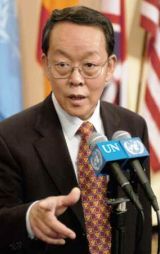China seeks explaination of Sudan letter challenging UN Darfur plan
March 12, 2007 (UNITED NATIONS) — China’s U.N. ambassador called on Sudan’s president to explain a letter to the U.N. secretary-general challenging a plan to send United Nations peacekeepers to help African Union troops already on the ground in conflict-wracked Darfur.

|
|
UN Chinese Permanent Representative Wang Guangya . |
China’s U.N. Ambassador Wang Guangya said Sudan had agreed at a meeting in Addis Ababa, Ethiopia, in November to the three-stage U.N. plan that would strengthen the 7,000-strong AU force and culminate in a 22,000-strong joint U.N.-AU peacekeeping mission.
“Last year, in Addis, the understanding is clear that we are committed to this,” he said. “So therefore, it seems that there are some miscommunications and misunderstandings of all this.”
While the three-stage plan was agreed to at a meeting attended by former U.N. Secretary-General Kofi Annan and then endorsed by the African Union’s Peace and Security Council in late November, Sudan’s President Omar al-Bashir is clearly unhappy with it.
In January, he said the U.N. troops were not needed because the AU force on the ground could handle the job. In his letter to Secretary-General Ban Ki-moon, who succeeded Annan on Jan. 1, al-Bashir made scant reference to the November agreements, instead arguing that the U.N. plan “contravenes” the Darfur Peace Agreement signed in May 2006 between Sudan’s government and one of Darfur’s rebel factions.
The first stage of the U.N. plan – a “light support” package adding some equipment, military officers and U.N. police to the AU operation – is nearly complete. But the second phase – deploying a “heavy support” package with more than 3,000 U.N. military, police and civilian personnel, along with substantial aviation and logistical assets – has been held up for two months waiting for al-Bashir’s letter and expected acceptance.
Al-Bashir, however, did not agree to the second phase as outlined by the U.N.
He insisted in the letter that the November agreement established that the U.N. would provide the AU force with technical and financial assistance and “military consultants with ranks below that of the military commander appointed by the African Union.” He also objected to a section of a U.N. report stating that “full U.N. involvement in command and control would be a prerequisite for U.N. funding and troop contribution.”
As for the so-called “hybrid” AU-U.N. force in phase three, al-Bashir said, “the AU forces implementing that phase, in terms of control or command, must remain forces of the African Union supported by the United Nations as per the two packages.”
Asked what the next steps were, China’s Wang said “I think that probably more clarification is needed to proceed. … I think some explanation” is required.
“For the second and third stage, I believe that politically speaking all the parties at Addis are committed to it,” Wang said.
Russia’s U.N. Ambassador Vitaly Churkin, whose country like China has significant commercial interests in Sudan, said Moscow is analyzing al-Bashir’s letter and wants to hear what the secretary-general thinks about it.
“Probably it’s less than the radically positive answer that the secretary-general was hoping for, but I don’t think it’s necessarily going back,” Churkin said. “The thing is that we need to continue the dialogue with the government in Khartoum, and the U.N. has to be prepared for all options.”
Al-Bashir strongly supported a joint U.N.-AU effort to revive peace talks and get all rebel groups to sign the Darfur Peace Agreement. Russia’s Churkin strongly backed the U.N. political effort led by Sweden’s former foreign minister, Jan Eliasson, which is only beginning.
“So we shouldn’t be disheartened too quickly,” Churkin said.
Acting U.S. Ambassador Alejandro Wolff said he had not studied the al-Bashir letter carefully but was not surprised at the initial indications of “firm resistance and no progress.”
“I’ve been saying all along we take one step forward and 1 1/2 steps back,” he said.
Wolff said the U.S. would see whether it was time to pursue sanctions against Sudan.
Darfur’s conflict erupted in 2003 when ethnic African rebels took up arms against the Arab-dominated central government, accusing it of neglect. The government is accused of unleashing Arab militias known as the janjaweed, which are blamed for the bulk of the conflict’s atrocities.
(AP)
